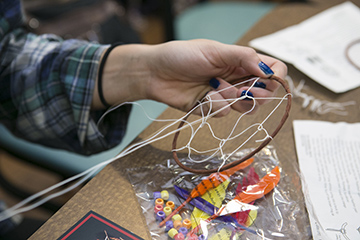
by Olivia Williams
Samford University’s Native American Heritage Month celebration kicks off Tuesday, Nov. 1. The university’s Office of Diversity and Intercultural Initiatives is coordinating events throughout the month to honor and remember the past while celebrating the future of Native Americans.
“The office has recently been focused on building relationships with other people, and the more you know about the people you come into contact with, the easier it is to form those relationships,” said Jenée Spencer, program assistant in the Office of Diversity and Intercultural Initiatives. “Events like these build bridges to bring people together.”
The first event is Nov. 1, 10:30 a.m.–1 p.m., where students and guests can enjoy Native American–themed dishes for lunch and dinner in the university’s main dining hall.
On Nov. 2, there will be a Lunch and Learn at 11:30 a.m. in the Howard Room of Beeson University Center. The focus of discussion is “The North Dakota Pipeline.” The event is free and open to the Samford community, but advance reservations are requested.
“The lunch and learn will be facilitated by Christi Malone, assistant attorney general for the Poarch Band of Creek Indians,” said Spencer. “She is going to speak on the pipeline and how it is affecting tribal lands and customs.”
On Tuesday, Nov. 15, 2–7 p.m., there will be an excursion to Moundville Archeological Park in Moundville, Alabama. Students will explore the park and museum, as well as enjoy dinner before returning to campus. The cost is $5, and convocation credit will be offered. Advance registration is requested.
“We’re going to go on a tour of the museum and reflect afterward about some of the things that we learn, and connect them to the faith journey at Samford,” Spencer said.
Native American Heritage Month will conclude with a documentary film, Native American Boomtown, Nov. 21 at 5 p.m. in Christenberry Planetarium.
“This is a segment of America by the Numbers,” Spencer said. “It’s about how the boom is bringing a lot of money to the tribe. They’re not used to the amount of people there, and they don’t have a police force to handle the crime. We’re going to talk about the repercussions of the oil boom.”
Olivia Williams is a journalism and mass communication major and a news and feature writer in the Division of Marketing and Communication.
